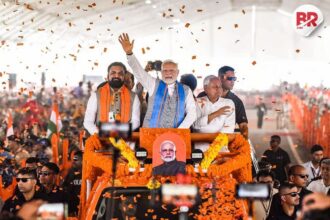
The Allahabad High Court has said that while every citizen has the right to free speech, it doesn’t mean they can make defamatory or harmful statements—especially against the Indian Army. This statement came as the court rejected Congress leader Rahul Gandhi’s request to cancel a legal summons against him.
Justice Subhash Vidyarthi of the Lucknow bench ruled on May 29 that there is enough initial evidence to suggest that Gandhi may have made defamatory remarks about the Indian Army. So, he must face trial. The High Court supported the earlier decision made by a lower court in February 2025, which had ordered Gandhi to appear in court.

The judge stated, “Freedom of speech is protected under Article 19(1)(a) of the Constitution, but this right has limits. It doesn’t include the freedom to defame any person or the Army.”
Why is Rahul Gandhi being summoned?
The case was filed by Udai Shanker Srivastava, a retired Director from the Border Roads Organisation (equal to the rank of Colonel in the Army). He said that during the Bharat Jodo Yatra in Lucknow on December 16, 2022, Rahul Gandhi made false and negative comments about a clash between Indian and Chinese soldiers in Arunachal Pradesh on December 9, 2022.

Srivastava claimed Gandhi’s comments were baseless and made to lower the morale of the Indian Army and shake the public’s faith in it. He pointed out that the official Army report on December 12, 2022, had said the Chinese soldiers came near the Line of Actual Control (LAC) in the Tawang area, but Indian troops responded strongly. A few soldiers on both sides got minor injuries, but the situation was handled firmly.
Also See: Chirag Paswan’s Bihar Move: Pressure on BJP or Plan to Replace Nitish Kumar?
Srivastava said Gandhi’s remarks hurt him and other patriotic citizens.
What did the lower court and High Court say?
On February 11, 2025, a Lucknow court summoned Rahul Gandhi under Section 500 of the Indian Penal Code (defamation). It said Gandhi’s statements seemed to damage the Army’s image and were not part of his official political duties.
Gandhi’s lawyer, Pranshu Agarwal, argued in the High Court that the complaint was politically motivated and Srivastava was not directly affected by the statement, so he couldn’t file a defamation case.
But the High Court disagreed. It said that Srivastava was indeed an “aggrieved person” under the law and had the right to file a complaint. The court also said the lower court had carefully reviewed the case and didn’t issue the summons blindly.
As a result, Rahul Gandhi will now have to attend court and face trial for his alleged remarks.












